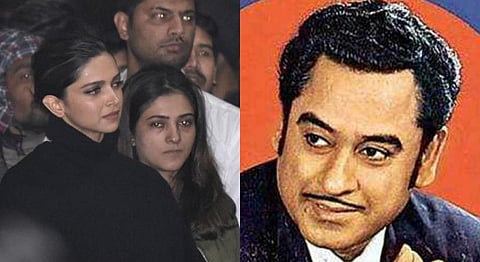
- #HGCREATORS
- #HGEXPLORE
- #HGVOICES
- #HGSHOP
- CAREERS
- ABOUT US
- CONTACT US

When popular Bollywood actor Deepika Padukone went ahead and joined students protesting against the recent violence on the Jawaharlal Nehru University (JNU) campus, Twitter was divided against two camps – one supporting her, and the other dissing her for what they called a ‘cheap publicity stunt’ she pulled off. Celebrities including Sonakshi Sinha, Anurag Kashyap, Konkana Sen Sharma, Richa Chaddha, and Anurag Kashyap stood by her, lauding her for taking up a staunch stand against violence. Recently, her name cropped up in a drug-related case that is inextricably being linked to the Sushant Singh Rajput case. A few bits of WhatsApp messenger chats from 2017 are being used as evidence to question her on the usage of soft drugs.
Deepika, along with actresses Sara Ali Khan, Shraddha Kapoor and Rakul Preet Singh, has been summoned by the Narcotics Control Bureau (NCB) that aims to probe deeper into the matter. Since drug laws in India are questionable and marijuana is used extensively for different purposes in the form of CBD oils, occasional recreational purposes, as well as religious purposes, the cases against these actresses are ambiguous and loosely based without any concrete evidence. This seems like essentially an effort to construct a divisive sentiment among plebeians towards the so-called ‘elites’ of the country, which include Bollywood. Besides, silencing the anti-establishment voices of Bollywood (an industry which entertains millions around the country and abroad) is a stepping stone to using the avenue of the democratic art form of cinema to push the authoritarian agenda of the government. Bollywood must be made more ‘sanskari’ and ‘patriotic’ and be made to fall in line with the government’s hardline nationalist politics.
However, this is not a solitary incident in the history of India’s democracy, but rather one in the long list of accusations against celebrities/people who spoke against the establishment.
Kishore Kumar and Manoj Kumar
Long back, in 1976, when the Emergency was in full force in the country, Kishore Kumar was boycotted by Doordarshan and the All India Radio at the order of the then-Information & Broadcasting minister, Vidya Charan Shukla. The ban on Kumar was revoked only when the Emergency ended in 1977 and Indira Gandhi was voted out of power. The singer had drawn the government’s ire when he refused to sing for radio or TV, as well as refusing to perform at a Youth Congress rally in Mumbai.
Manoj Kumar, who was initially a supporter of the Emergency, eventually emerged as one of the most powerful voices of dissent when he refused to direct a pro-Emergency documentary that the government approached him with. Of course, he had to pay the price for it. Merely two weeks before his movie, Shor was to hit the theatres, it was telecast on Doordarshan, thereby making it a failure at the box office. He also had to go through lengthy and expensive court proceedings, when his film, Dus Numbri was banned. However, he won the case, becoming the first and only filmmaker in the country to win a case against the Emergency.
Dev Anand, Shatrugan Sinha, and others
Other celebrities bearing the brunt of speaking against the Indian government included actors like Dev Anand and Shatrugan Sinha who refused to comply with the government on different accounts. Both faced repercussions, as their movies were banned on Doordarshan.
Artists like Gulzar, Satyajit Ray, V. Shantaram and others supported these actors in their fight against the government.
Deepika Padukone, Pooja Bhatt, Anurag Kashyap, Swara Bhaskar, and others
Fast forward five decades and the situation has remained pretty much the same, or maybe become even worse. Besides educators, protesters, students, and human rights activists being rampantly arrested for speaking up against the government, celebrities too have come to be at the receiving end of state injustice. Actress Pooja Bhatt was among the first Bollywood personalities who openly expressed their opinion against the CAB.
Actress-turned-author Twinkle Khanna, in opposing the CAB also said, “Discrimination based on race, colour, caste, religion and other such social constructs in whatever form, goes against the fundamental moral integrity of the human condition.”
Actors Swara Bhaskar, Rajkumar Rao, Huma Qureshi, Dia Mirza, Ali Fazal, filmmakers, Anubhav Sinha, Kabir Khan, Vishal Bhardwaj and others also took to Twitter to protest against the CAB.
A couple of years earlier, Hindu nationalist groups had threatened Deepika Padukone with dire consequences, since her film, Padmaavat (2018) had a scene that included a dream sequence of a Muslim king wanting to be intimate with a Hindu queen played by Padukone. Mobs vandalised the film’s sets, setting back its production schedule.
For years, a sharp divide has existed between the government and the Indian film fraternity. Whoever spoke against the Establishment was eventually put in a spot with either personal threats or the destruction of their careers. It is because of this that even now, many Bollywood bigwigs have held themselves back in fear. We can just hope that, instead of using silence as ammunition against the Establishment, celebrities can actually come forward with their opinions without fear for retribution.
If you enjoyed reading this article, we suggest you also read:
